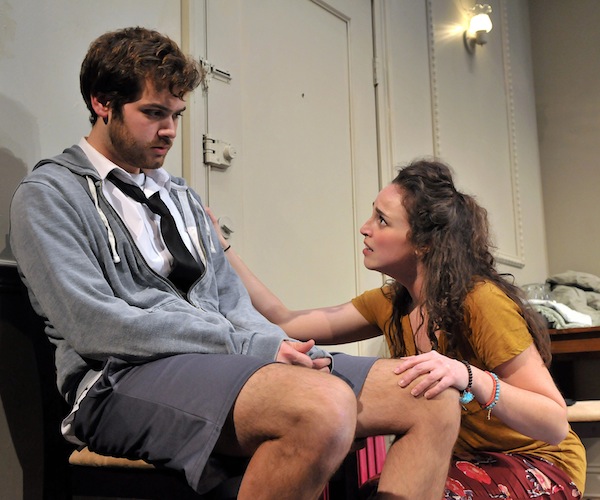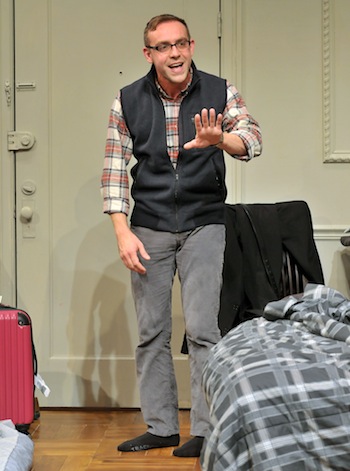Theater Review: “Bad Jews” — Lots of Sound and Fury
Joshua Harmon steers his play to the middle ground where his two lead characters – representing polar opposites, cultural versus religious Judaism – ultimately exhaust one another, and us.
Bad Jews, by Joshua Harmon. Directed by Rebecca Bradshaw. Presented by SpeakEasy Stage Company, Calderwood Pavillion, Boston Center for the Arts, 527 Tremont Street, Boston, through November 29.

Alison McCartan (Daphna) talks to Alex Marz (Jonah) in the SpeakEasy Stage Company production of “Bad Jews.” Photo: Craig Bailey/Perspective Photo.
By Robert Israel
You are not likely to leave Bad Jews, an uneven, mish-mash of a one-act play, with much clarity regarding just who is a “bad Jew” or who is a “good Jew.” While playwright Joshua Harmon has a keen ear for dialog and is adept at creating a raucous mood of dissonance and discord, he avoids taking sides, thus his fireworks are not all that illuminating. Instead, he steers his play to the middle ground where his two lead characters – representing polar opposites, cultural versus religious Judaism – ultimately exhaust one another, and us, with assaults of unbridled cruelty. At final curtain, we’re spent and none the wiser.
Set in a cramped studio apartment in New York City’s Upper West Side, we meet Jonah (Alex Marz), sprawled on the floor playing a video game, stripped down to his skivvies, white shirt, and black tie. Enter his cousin, Daphna (Alison McCartan), disheveled and loquacious. The subsequent banter – she does most of the talking – sets the plot in motion. The two cousins are gathered together to pay final respects to their beloved grandfather, Poppy, a Holocaust survivor who served as the emotional glue holding their families together. They are twenty-something American Jews, ensconced in their studies at universities but, given the occasion, now invited to face the specter of mortality. Also expected to join the pair, camping out in the apartment like youngsters at a slumber party, are two others: Liam (Victor Shopov) Jonah’s intellectual brother, and his non-Jewish girlfriend, Melody (Gillian Mariner Gordon). Liam and Melody have missed the funeral, but arrive in time for the shiva, or period of mourning.
What follows resembles the goings-on in God of Carnage, Yasmina Reza’s play, where seemingly civilized adults start off polite and then go at it until they are left scarred and shattered. In Bad Jews, however, Judaism is the unruly beast in the jungle of civilization. Faith is represented via a golden trinket, a “chai” (Hebrew for “life”) left behind after Poppy’s death. Liam has claimed it and it is in his possession. Daphna wants it. Each has their reasons for valuing the token. The back story: Poppy hid the “chai” under his tongue while in captivity in the Nazi camp. He presented it to his bride, the cousins’ grandmother, instead of a ring, during his marriage ceremony. Liam wants to do the same thing with Melody. Daphna will have none of it.

Victor Shopov (Liam Haber) in the SpeakEasy Stage Company production of “Bad Jews.” Photo: Craig Bailey/Perspective Photo.
The cast, like the play itself, is uneven. As Jonah, Marz plays his character as if he had been left traumatized after being swallowed by the Biblical whale. Even when given the chance to speak, Marz is ineffectual. There is no familiar chemistry between Jonah and Daphna, little eye contact. In the only scene where Jonah shows affection for his brother Liam, you are left wondering if they are related at all. During most of his scenes, Marz sits off to stage left, as wooden as a bookcase. As Daphna, Alison McCartan tries but fails to convey a strong impression of an impassioned Jewish identity. She is supposed to be a “baal tesuvah” Jew – Hebrew for “born again” — who is moving to Israel after graduation from Vassar later that spring. Then she will hook up with an Israeli man she intends to marry. But we aren’t convinced. Like much in this play, it’s all a set up for polemics.
The bravura performance in Bad Jews is supplied by Victor Shopov as Liam. He commands the stage and makes the most of a memorably riveting meltdown. He is a furnace ready to explode: his face reddening from the lobes of his ears to the top of his head. Shopov is matched by Gillian Mariner Gordon, who supplies a few cool breezes while the lava spews out of the domestic/religious volcano.
What Bad Jews lacks is a sense of Judaism that is summed up in the word, “Yiddishkeit,” which translates as “Jewish way of life.” Jews have been debating for centuries – and the play references this squabbling – about which path to take toward righteousness. This is far from a new argument. But why it remains compelling is that men and women, young and old, who engage in this discourse feel something about their faith, and need to find new ways to articulate that emotional dedication amid changing times and cultures. Bad Jews pumps out lots and lots of hot air about the quandaries of modern Judaism, and some it is explosive. But most of it is vapid, an academic exercise rather than a cri de coeur.
Robert Israel writes about theater, travel and the arts, and is a member of Independent Reviewers of New England (IRNE). He can be reached at risrael_97@yahoo.com
